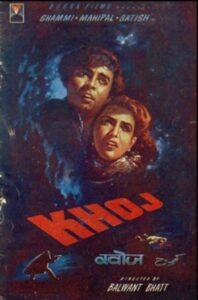The Re 1 Song for a Struggling Composer

In the annals of Indian cinema, many tales of struggle and triumph have unfolded, but few shine as brightly as those illuminating the inherent goodness of its legends. One such story, often overlooked, perfectly encapsulates the magnanimous spirit of the unparalleled playback singer, Mohammad Rafi. It’s a testament to his character that even when at the pinnacle of his career, he never forgot the struggles of those striving to make their mark. This heartwarming act of charity solidifies his legacy beyond his musical genius.
Our story takes us back to 1953, to an obscure, low-budget C-grade film titled “Khoj.” The musical score for this film was helmed by a composer named Nissar Baazmi. At this point in his career, Baazmi was far from the household name he would later become. In fact, he was virtually unknown, struggling to gain a foothold in the competitive Indian music industry. Interestingly, Baazmi would later migrate to Pakistan, where his genius would finally be recognized, rising to such prominence that even musical titans like Noorjehan and Mehdi Hassan considered it an honor to sing for him. But during his time in India, he remained, regrettably, a “C-grade composer.”
For “Khoj,” Baazmi faced a significant hurdle: a severely limited budget. His producer could only afford a maximum of Rs 50 for a single song. This paltry sum presented a considerable challenge, especially when trying to secure the vocal talents of someone of Mohammad Rafi’s caliber, who by then was already a highly sought-after artist.
Undeterred, and with a composition he deeply prided himself on, Baazmi approached the legendary Rafi. What transpired next is a remarkable display of Rafi’s incredible humility and generosity. Knowing Baazmi’s financial constraints and recognizing his talent, Mohammad Rafi, known for his philanthropic spirit, agreed to sing for a mere Re 1. Yes, a single rupee. This iconic act of kindness would become a testament to his character.
For this token amount, Rafi lent his golden voice to the memorable song “Chanda ka dil toot gaya roney lage hain sitaare” with poignant lyrics by Raja Mehdi Ali Khan that began with the cry: “Mohabbat aur wafaa kis tarah tauheen ki tu ne.” This wasn’t just another recording; it became a significant hit on Radio Ceylon, captivating audiences with its emotional depth and showcasing Rafi’s unwavering support for new talent.
What makes this act truly remarkable is not just the minimal fee, but the sheer passion and dedication Rafi poured into the rendition. He didn’t treat it as a charity project; instead, he infused the song with his characteristic emotional intensity and unparalleled artistry. He elevated a struggling composer’s tune into a compelling masterpiece, demonstrating that for him, music was not merely a profession but a profound expression of art, and true talent deserved to be nurtured, regardless of the financial returns. This exemplifies Mohammad Rafi’s legacy of generosity.
Mohammad Rafi’s gesture in “Khoj” is more than just a footnote in his illustrious career; it’s a powerful reminder of his compassionate nature and his unwavering belief in the power of music. It showcases a rare blend of humility, artistic integrity, and boundless generosity that set him apart as not just a vocal maestro, but a truly remarkable human being. His act of kindness towards Nissar Baazmi serves as an enduring inspiration, proving that true greatness lies not just in one’s achievements, but in the positive impact one has on the lives of others. It solidifies why Mohammad Rafi is celebrated for his humanitarian acts.
+~ Balwant S. Wadhwani
Balwant S. Wadhwani is the founder of RafiFanClub.com. A lifelong devotee and archivist at heart, he has dedicated his life to sheltering the echoes of the Golden Era. His singular mission is to ensure Mohammad Rafi’s divine voice transcends every earthly boundary—traveling to the most humble, distant hearts to unite all souls, regardless of language, caste, or creed, in a shared moment of celestial grace.
